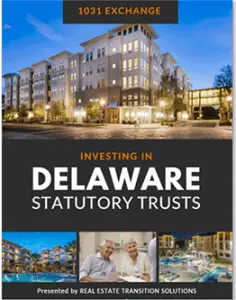Is a Delaware Statutory Trust Right for Me?
Strategic decision making requires a framework for breaking down the variables and evaluating options. Determining what to do with your investment real estate is no different. Most multifamily and residential rental owners have heard about the benefits associated with selling their appreciated investment property and performing a tax-deferred 1031 exchange. Exchanging into a Delaware Statutory Trust as a replacement property has several unique advantages as well as risks & restrictions. So how does a property owner know if DSTs are right for them?
The answer to this question depends entirely on the individual owner’s financial and lifestyle objectives, as well as their overall financial picture. The goal of this article is to provide a framework for evaluating whether a 1031 exchange into Delaware Statutory Trusts may be a fit for you.
Step 1 – Determine Your Financial and Lifestyle Objectives
Real estate can be a tremendous investment for many reasons. Few assets can simultaneously generate income potential, appreciation, and shelter cash flow from income tax through depreciation. Furthermore, owners can influence their investments by choosing tenants, investing in improving the property, and refinancing the property when advantageous. Along with these positive elements comes variability in the level of income potential from year-to-year and month-to-month, management effort, regulatory risk and concentration risk. While controlling and managing your real estate may be one of the best ways to build wealth, it may not be the best fit as an owner begins to place greater value on stable potential income, diversification, estate planning, and free time. We encourage all owners to reflect on and evaluate the following objectives:
- Income – How much income do you both currently have and want? How important is income stability to you?
- Appreciation Potential – Are you focused on growing your investments?
- Desire to Actively Manage Property – Do you enjoy managing properties? Who would manage your properties if something were to happen to you?
- Preservation of Capital – Are you concentrated in one property type and/or one geographic area? Do you have the investment timeline to hold through a full real estate market cycle?
- Estate Planning – Are your properties staged for an eventual transition to beneficiaries? Will your beneficiaries have to co-own and manage properties together?
- Risk Tolerance – Are you diversified? Do you feel comfortable with factors outside your control such as the landlord-tenant laws or potential re-zones?
- Tax Mitigation – Do you have depreciation remaining in your properties?
Objectives should be evaluated based on not only what you are looking to accomplish today, but also over the coming years and decades. One thing we cannot stop is the passage of time, which means owners must consider the future right now in order to be staged for success down the road.
Step 2 – Evaluate Your Properties
Once an owner has determined their objectives, the next step is to evaluate whether their current properties meet those objectives. By no means is this an “all or nothing” decision. Some properties may have a strong history of low management effort, stable income potential, appreciation, and little deferred maintenance. For others, this may not be the case. If income is an objective, a worthwhile exercise is to review your most recent tax return and compare the net cash flow from your Schedule E (if the property is 100% owned by you) or K1 (if the property is owned in a partnership or multi-member LLC) to the net equity in the property. The net equity can be calculated by taking the property’s estimated value and subtracting any outstanding loan. This figure, expressed as a percentage, is the property’s ROE (return on equity). If the ROE is below 5%, from our experience there may be other options, such as Delaware Statutory Trusts when suitable, that have the potential to enhance your income. Note, when performing this analysis there should be an expense taken for management, even if you manage the property yourself. Your time has value and the cost of your time should be considered and reflected in the analysis.
Step 3 – Evaluate Your Potential Tax Liability
If it appears your properties may not meet your objectives, the next step is to consider whether an exchange is warranted. No one likes to pay taxes. Fortunately, 1031 exchanges allow for investment real estate to be sold and reinvested while deferring the tax liability that would otherwise result from a sale. In Washington State, taxes on the sale of investment real estate can be as high as 28.8%. Determining the tax liability associated with a potential sale is not overly complicated but does require an understanding of the property’s value and remaining tax basis. If you are interested in understanding the tax liability associated with your property, I encourage you to reach out to us to receive a complimentary copy of our Real Estate Investment Tax Analysis Worksheet. The amount of tax that warrants an exchange depends on the owner’s financial situation and objectives.
Step 4 – Understand Your Available Options
There are many forms of investment real estate, each of which presents its own benefits, opportunities, and risks. Knowing your options is key to making informed decisions. If you would like to learn more about your options, I encourage you to visit our website and sign up for our 1031 Exchange Replacement Property Options webinar series. An informed investment property owner will be much more effective in staging themselves and their property to accomplish their objectives.
Step 5 – Schedule a Free Consultation with Real Estate Transition Solutions
At Real Estate Transition Solutions, our focus is on educating investment property owners and developing strategies that will help reposition their investment real estate so that it helps meets their objectives over the years and decades to come. Our firm has worked with dozens of investment property owners to determine their objectives, analyze their properties, and provide suitable tax-efficient recommendations to help stage them for future success. Each, and every, property owner is unique. Working with a trusted 1031 Exchange partner that understands your specific goals and has both the experience and expertise to assist you in a transition will help you as you navigate the next chapter of life.
If you are interested in discussing your objectives and properties, I encourage you to reach out. We are always happy to provide a complimentary consultation. Our consultations can be done over the phone, via web conference, or in person at our offices located in Seattle, WA, and in Portland, OR. To schedule your free consultation, simply call 206-686-2211 or CLICK HERE.

Features 28 pages with rules, tips, examples, and more.
The information herein has been prepared for educational purposes only and does not constitute an offer to purchase or sell securitized real estate investments. Such offers are only made through the sponsors Private Placement Memorandum (PPM) which is solely available to accredited investors and accredited entities. DST 1031 properties are only available to accredited investors (generally described as having a net worth of over $1 million dollars exclusive of primary residence) and accredited entities only. If you are unsure if you are an accredited investor and/or an accredited entity please verify with your CPA and Attorney. There are risks associated with investing in real estate and Delaware Statutory Trust (DST) properties including, but not limited to, loss of entire investment principal, declining market values, tenant vacancies and illiquidity. Potential cash flows/returns/appreciation are not guaranteed and could be lower than anticipated. Diversification does not guarantee profits or guarantee protection against losses. Because investors situations and objectives vary this information is not intended to indicate suitability for any particular investor. This material is not to be interpreted as tax or legal advice. Please speak with your own tax and legal advisors for advice/guidance regarding your particular situation. Securities offered through Aurora Securities, Inc. (ASI), Member: FINRA/SIPC. Advisory services offered through Secure Asset Management, LLC (SAM), a Registered Investment Advisor. ASI and SAM are affiliated companies. Real Estate Transition Solutions (RETS) is independent of ASI and SAM.

- Speak with a licensed 1031 Exchange Advisor
- Discuss your potential tax liability
- Understand benefits vs. risks
- Discuss 1031 Exchange options

